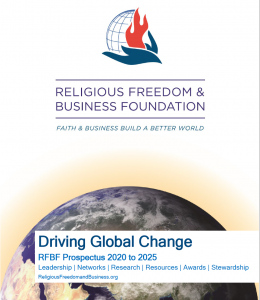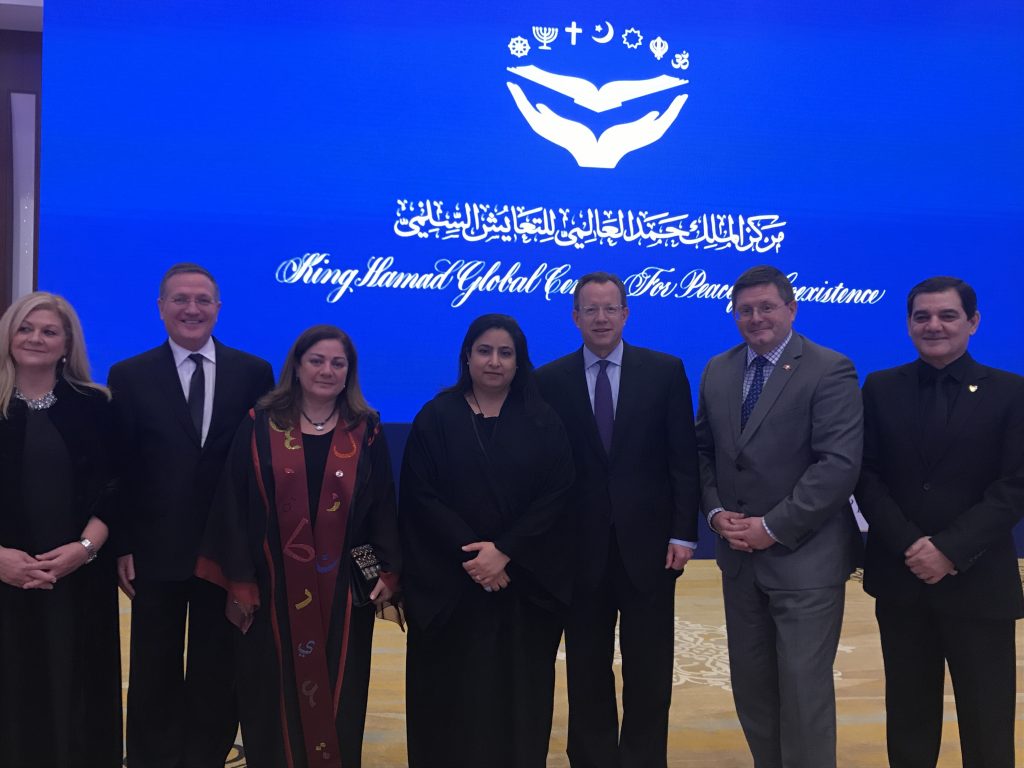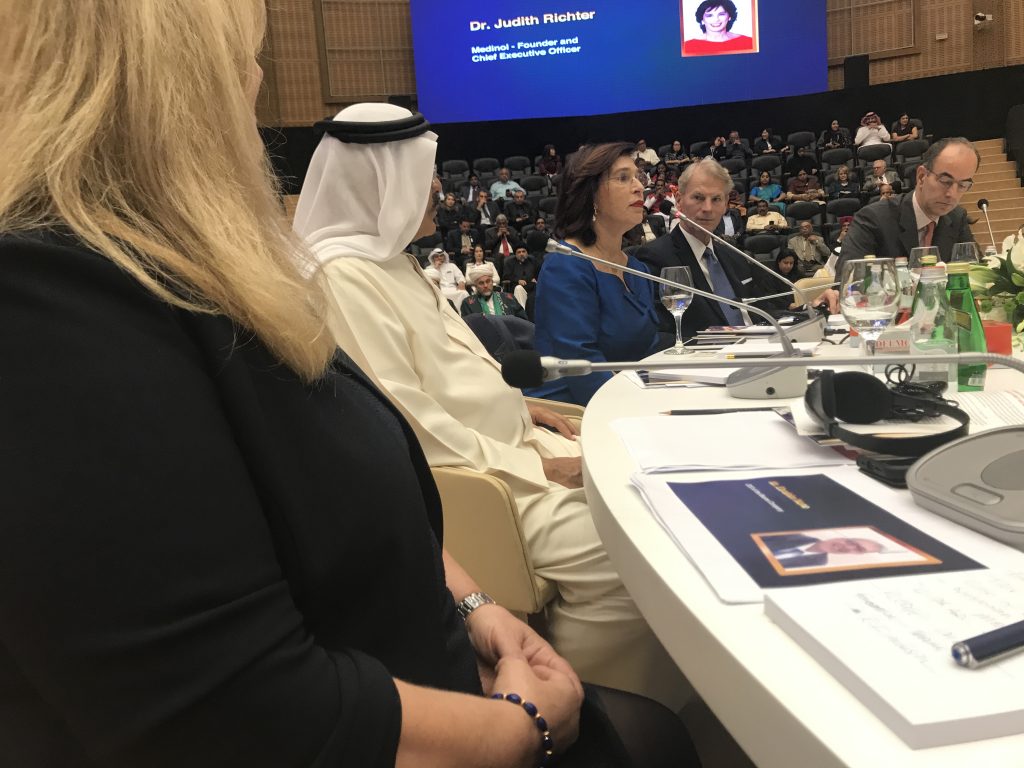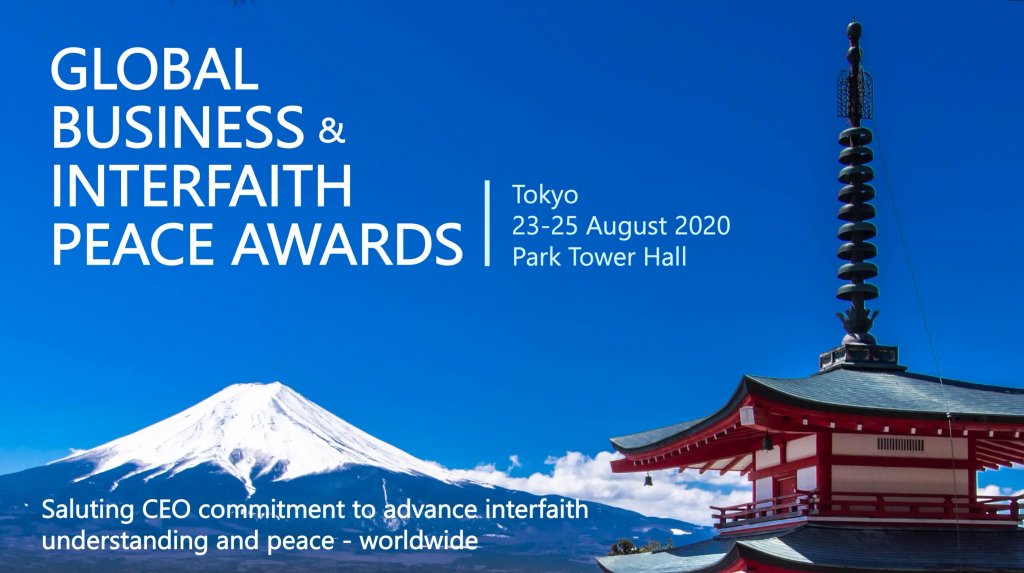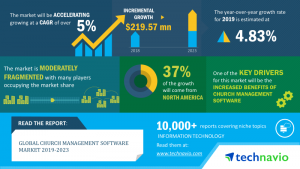The Religious Freedom & Business Foundation (RFBF) and the Tim and Steph Busch School of Business at the Catholic University of America (CUA) hosted the first-ever national conference for faith-oriented Employee Resource Groups (ERGs) on February 13-14, 2020, in Washington, DC. This multi-day event — cosponsored by American Airlines and Tyson Foods — brought together ERG leaders from across corporate America to share their experiences, best practices and perspectives on the future of this accelerating trend toward faith-based ERGs at some of America’s biggest and most recognizable companies.
Faith at Work Conference (video)
Breaking News: New Index Measures Corporate Religious Inclusion
12 Feb, 2020
More US Firms Are Boosting Faith-Based Support For Employees, AP
By DAVID CRARY, AP, National Writer
It has become standard practice for U.S. corporations to assure employees of support regardless of their race, gender or sexual orientation. There’s now an intensifying push to ensure that companies are similarly supportive and inclusive when it comes to employees’ religious beliefs.
One barometer: More than 20% of the Fortune 100 have established faith-based employee resource groups, according to an AP examination and there’s a high-powered conference taking place this week in Washington aimed at expanding those ranks.
“Corporate America is at a tipping point toward giving religion similar attention to that given the other major diversity categories,” says Brian Grim, founder and president of the Religious Freedom & Business Foundation that’s co-hosting the conference along with the Catholic University of America’s Busch School of Business. Read the full story.
Fox News
Other Recent Coverage
- New York Times
- Washington Post
- HR Drive
- Christianity Today
- Deseret News
- Inside Sources
- NET TV
- Crux
- Yahoo Finance
- Religion News Service
- Aleteia: English | Spanish
- Supermarket Perimeter
- PR Newswire
- Relevant Magazine
- World Champs Podcast
- God & Culture Interview
- Angelus News
- VOA
- EWTN
- DomRadio (German)
- ChristianHeadlines
- El Nacional (Spanish)
- Univ. of Arkansas News
- The Boston Pilot
DAVOS: Diversity is top of the corporate agenda. Why doesn’t that include faith?
Conversation with Cardinal Dolan
EWTN News Nightly
NET TV
FOR IMMEDIATE RELEASE: JANUARY 30, 2020
30 Jan, 2020
 FOR IMMEDIATE RELEASE: JANUARY 30, 2020
FOR IMMEDIATE RELEASE: JANUARY 30, 2020
Contact: Religious Freedom & Business Foundation, media@religiousfreedomandbusiness.org – +1.410.268.7809
Google Tops New Religious Inclusion Rankings
Most Fortune 100 Companies Neglect Faith-Friendly Workplace Initiatives
New Corporate Religious Equity, Diversity and Inclusion (REDI) Index Gives High Marks to Several Tech, Financial Firms and Other Fortune 100 Brands
Index Finds Corporations Continue to Overlook Religious Inclusion, with More than Half of the Fortune 100 Making No Public Mention of Faith as Part of Diversity Initiatives
(ANNAPOLIS, MD) – A new annual ranking of Fortune 100 companies shows many fail to include faith and religion as part of corporate diversity initiatives. The Religious Freedom & Business Foundation’s new Corporate Religious Equity, Diversity and Inclusion (REDI) Index, released today, gives high marks to major companies like Google/Alphabet, Tyson Foods, and Intel for taking steps to recognize the importance of faith in the lives of employees.
The REDI Index establishes a new benchmark for annual assessment of the state of corporate America’s inclusion of religion as an integral part of its diversity initiatives. Despite a positive faith-friendly trend emerging in a number of major corporations, the REDI Index also exposed striking shortfalls among Fortune 100 companies. Most companies on the list continue to overlook religious inclusion in favor of prioritizing other important diversity classifications such as race, sexual orientation, disability and others.
“Companies scoring well on the REDI Index are using a variety of innovative programs to make faith expressions more welcome in the workplace, creating a more inclusive environment,” said Dr. Brian Grim, President of the Religious Freedom & Business Foundation. The Foundation is the leading global authority on issues surrounding how faith contributes to global business and economic success.
Each of the top ten companies encourage respectful religious expression in the workplace ranging from the development of faith-based Employee Resource Groups to having corporate chaplains. The top ten companies in the 2020 REDI Index raking are:
- 1. Google/Alphabet
- 2. Intel (tie)
- 2. Tyson Foods (tie)
- 4. Target
- 5. American Airlines (tie)
- 5. Facebook (tie)
- 7. Apple
- 8. Dell
- 9. American Express (tie)
- 9. Goldman Sachs (tie)
Alphabet/Google scored highest on the 2020 REDI Index because of the number and diversity of faith- and belief-based Employee Resource Groups (ERGs) mentioned on the company’s website. Google has established an Inter Belief Network (IBN) that aims to create a culture of inclusion, tolerance, and mutual understanding at the company. IBN consists of multiple member chapters representing specific communities of interest, including but not limited to Buddhists, Christians, Jewglers [Google’s term], and Muslims. Google’s IBN also aims to ensure that the voices of belief-based communities are represented in Google’s products.
Tied for second in the ranking, Tyson Foods openly welcomes what they call “the whole person,” when it comes to matters of faith, even fully including those who don’t identify as “religious.” The company has ninety-eight dedicated chaplains that can provide compassionate pastoral care to team members and their families, no matter what their religious affiliation or beliefs.
 While some of the biggest brands have begun recognizing that respect for faith expression is vital to recruitment, retention and creating a productive work environment, the majority of Fortune 100 companies have yet to account for the value of faith-friendly workplaces. The REDI Index revealed that outside of the top ten, many Fortune 100 companies fail to include religion as compared to other major identity categories: race/ethnicity, women/gender, sexual orientation, veterans/military, dis/ability, age, and family. “With religious affiliation and diversity continuing to grow world-wide between now and 2050, companies that fail to understand the value of a religiously inclusive workplace are increasingly at a competitive disadvantage,” stated Grim.
While some of the biggest brands have begun recognizing that respect for faith expression is vital to recruitment, retention and creating a productive work environment, the majority of Fortune 100 companies have yet to account for the value of faith-friendly workplaces. The REDI Index revealed that outside of the top ten, many Fortune 100 companies fail to include religion as compared to other major identity categories: race/ethnicity, women/gender, sexual orientation, veterans/military, dis/ability, age, and family. “With religious affiliation and diversity continuing to grow world-wide between now and 2050, companies that fail to understand the value of a religiously inclusive workplace are increasingly at a competitive disadvantage,” stated Grim.
REDI Index Top Line Findings include:
- – 57 of the Fortune 100’s diversity landing pages fail to make a single mention of faith or religion.
- – Race or Ethnic Diversity is mentioned more than 1000 times across company public platforms, but religion only 92.
- – Fewer than 1-in-5 (18-percent) of companies mention having faith-related Employee Resource Groups (ERGs)
- – Of 775 ERGs touted by companies, only 5% are related to faith, interfaith, religion or specific religions
- – Companies that include faith in diversity programs are overall more inclusive, including LGBTQ inclusion
“Failing to foster religious inclusion can be costly. In 2017, there was a $25 million court finding against Hilton for not reasonably accommodating the religious needs of a dishwasher. A high-profile Supreme Court decision was also rendered against Abercrombie & Fitch for putting their ‘looks policy’ above religious nondiscrimination. Going beyond the minimum legal requirements, employers are increasingly promoting religious diversity and inclusion in order to strengthen employee recruitment and retention,” Grim said.
“While companies still have a long way to go to be faith-friendly, with major brands like Walmart, Salesforce, PayPal and others also starting to make this a priority, we are at a tipping point at which we will very likely see greater momentum on this issue in the near future. That’s a great thing for business, especially because it means better, more inclusive workplaces for employees,” said Grim.
The full study, including its methodology and the rankings of all Fortune 100 companies can be found at: https://religiousfreedomandbusiness.org/redi.
Next month, the Religious Freedom & Business Foundation in conjunction with the Busch School of Business at Catholic University will hold a groundbreaking conference in Washington DC, “Bringing Your Faith to Work,” for employees and executives to discuss the importance of corporate programs that foster religious inclusion. It will feature executives and members of faith-oriented Employee Resource Groups (ERGs) sharing best practices, challenges and opportunities.
###
ABOUT THE RELIGIOUS FREEDOM AND BUSINESS FOUNDATION
The Religious Freedom & Business Foundation is the preeminent organization dedicated to educating the global business community, policymakers, non-government organizations and consumers about the positive power faith and religious freedom for all have on business and the economy. RFBF believes that business and religious freedom combine to form a powerful force for a better world. Through groundbreaking expert research, training programs, practical business tools and convening interfaith dialogue, RFBF helps demonstrate the critical link between respect for faith, successful enterprise and dynamic national economies. RFBF’s pioneering work serves as a catalyst for executives to promote Freedom of Religion or Belief for all people through employee programing, customer-facing policies, and leveraging their broader societal influence. RFBF is a non-partisan, non-political registered 501(c)3 non-profit organization in the United States. For more information or to get involved visit www.ReligiousFreedomandBusiness.org.
Jobs – Helping Those With Disabilities at 2020 Tokyo Paralympics
18 Jan, 2020
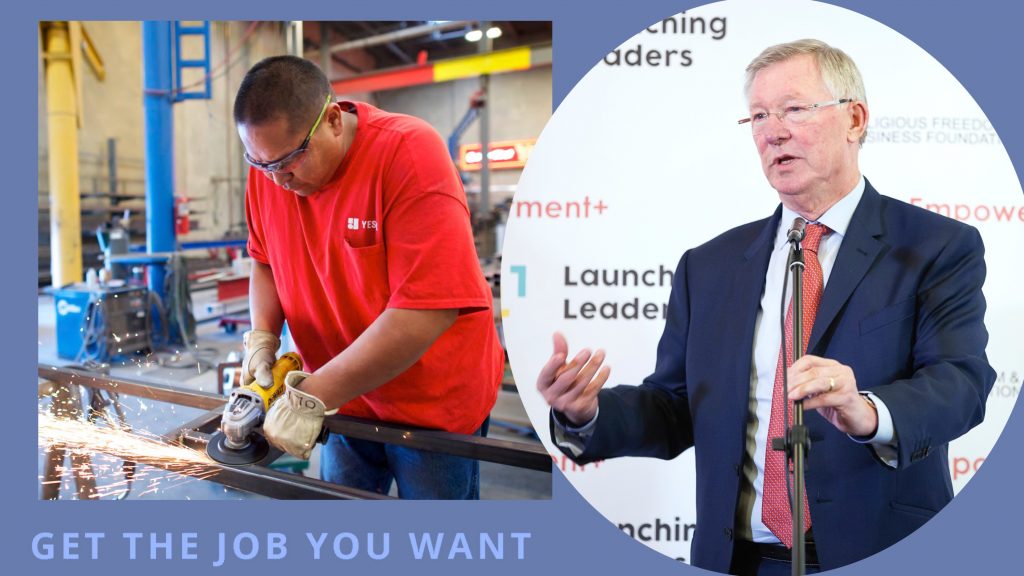 IMMEDIATE RELEASE: Tokyo: The Religious Freedom & Business Foundation is taking the interfaith ‘job search skills’ course we piloted in Manchester — with support there from former Manchester United’s Manager Sir Alex Ferguson — to Tokyo!
IMMEDIATE RELEASE: Tokyo: The Religious Freedom & Business Foundation is taking the interfaith ‘job search skills’ course we piloted in Manchester — with support there from former Manchester United’s Manager Sir Alex Ferguson — to Tokyo!
In Japan, the program will help people with physical challenges have enhanced skills to find and get better jobs.
The Religious Freedom & Business Foundation (RFBF) is pleased to announce that it will team up with The Church of Jesus Christ of Latter-day Saints to provide materials to help physically challenged workers and others find a better job. Several workshops, sponsored by Dare to Overcome, will be held prior to and following the 2020 Paralympics in Tokyo.
This builds on RFBF’s Empowerment-Plus program, which also involved collaboration with Latter-day Saints in using the same program to help people of different faiths and beliefs come together in Manchester, UK, to help each other find better employment. The program in Manchester also partnered with non-denominational Launching Leaders to offer personal development courses for young adults in a multi-faith setting, together with the Catholic, Muslim and Jewish Chaplaincies at Manchester University (see video with Launching Leaders Graduation at end). We also offer Launching Leaders in three regions of Africa in partnership with URI.
In Japan, The Church of Jesus Christ of Latter-day Saints will translate an Interfaith version of a workbook used in its self-reliance program entitled, ‘Get the Job You Want’. This is a 12-lesson seminar aimed at helping the under- or unemployed prepare themselves for a successful job search by becoming their best selves through working with God, their families, and communities. Participants will learn the importance of giving back to their families and community after achieving success.
Topics covered during the two-hour, weekly course include: basics of a job search, networking, matching skills to employer needs, writing a resume, and interviewing. This interactive course is led by a facilitator who will help prepare participants for success in finding a better job. Plans are to hold workshops at multiple locations in the Tokyo area. The Church will print and provide 400 manuals for the seminars.
Darwin Halvorson, Asia North Area Welfare and Self-Reliance Services Manager for The Church of Jesus Christ of Latter-day Saints, has served as a workshop facilitator many times. “One of the best results of the workshops is that most participants find jobs in less time than they would have without attending the group. At first, participants are hesitant and apprehensive. Soon, they relax, become energized and find hope. That is why they get excited. It helps them build confidence to find a job,” he added.
Dare to Overcome is a global business and peace symposium held biannually in support of the Paralympic Movement and people with disabilities. This symposium will be held at the start of the Summer 2020 Paralympic Games in Tokyo (Aug. 23-25). Dare to Overcome supports the mission of the Paralympic movement, in particular, to bring peace and empower those who face a variety of physical disabilities to succeed.
To get involved, email RFBF at: contact@religiousfreedomandbusiness.org
Empowerment-Plus Graduation, Manchester, UK
The Religious Freedom & Business Foundation (RFBF) is a non-partisan, nonpolitical, registered 501(c)3 non-profit organization in the United States, dedicated to educating the global business community, policymakers, non-government organizations and consumers about the positive power faith — and religious freedom for all — has on business and the economy.
Donate
28 Dec, 2019
Bringing Your Faith to Work
14 Dec, 2019
- – PROGRAM
- – REGISTER
- – Suggested Hotel: Washington Marriott at Metro Center
- – Faith-oriented ERG Conference map
- – Questions: contact@religiousfreedomandbusiness.org
Corporate Sponsors: American Airlines & Tyson Foods
⇒ See the News from the conference (AP, Fox, etc.)
CONFERENCE TO EXPLORE GROWING FAITH-FRIENDLY BUSINESS TRENDS AND RELIGIOUS INCLUSION IN THE WORKPLACE
Religious Freedom & Business Foundation, Busch School of Business at Catholic University to Co-Host Forum in Washington on faith-oriented Employee Resource Groups (ERGs)
(WASHINGTON, DC) – A growing trend in corporate America that is being embraced by some of the largest and most recognizable companies will be the topic of a first-of-its-kind conference in February. From Google to Facebook to Walmart, companies from a range of industries are recognizing that faith-friendly environments mean better workplaces and better businesses.
The Religious Freedom & Business Foundation and the Busch School of Business at Catholic University will hold a groundbreaking conference for employees and executives to discuss the importance of corporate programs that foster religious inclusion. The two-day conference will take place at The Catholic University of America in Washington, D.C., on February 13 and 14, 2020. The event will feature executives and members of faith-oriented Employee Resource Groups (ERGs) sharing best practices, challenges and opportunities.
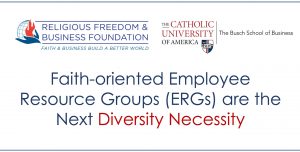 The conference will be keynoted by Sue Warnke, Salesforce Senior Director of Content & Communication Experience and the President of Faithforce San Francisco. Catholic University President John H. Garvey and Busch School Founding Dean Andrew Abela will also address attendees. The Busch School of Business was launched in 2013 with the aim of developing virtuous business leaders and using the resources of the Catholic intellectual tradition to advance a vision of business in service to society and human dignity. A range of corporate speakers will also discuss the importance of faith in business at the conference.
The conference will be keynoted by Sue Warnke, Salesforce Senior Director of Content & Communication Experience and the President of Faithforce San Francisco. Catholic University President John H. Garvey and Busch School Founding Dean Andrew Abela will also address attendees. The Busch School of Business was launched in 2013 with the aim of developing virtuous business leaders and using the resources of the Catholic intellectual tradition to advance a vision of business in service to society and human dignity. A range of corporate speakers will also discuss the importance of faith in business at the conference.
“Corporate America is recognizing that respect for faith expression is vital to recruitment, retention and creating a productive work environment,” said Dr. Brian Grim, President of the Religious Freedom & Business Foundation. The Foundation is the leading global authority on issues surrounding how faith and businesses can interact for a more peaceful and prosperous world. “The employees will be sharing their experiences and helping to drive the conversation. That’s really exciting.”
“While special inclusion programs surrounding race, gender and sexual orientation are the norm, the business community is rapidly realizing that faith expression is critically important. This conference will explore for the first time what’s working, challenges and ways businesses can foster a more faith-inclusive environment to lift all boats,” said Grim.
“The religious dimension is an essential part of human life, and any vibrant business ought to welcome and support this dimension,” said Dean Abela. “At the Busch School of Business, we teach that faith and business aren’t mutually exclusive. Employees should not have to check their beliefs at the door.”
Sessions at the conference will focus on:
- – The Business Case for ERGs: Why Faith-Friendly is Important to Business
- – ERGs & Workplace Spirituality
- – Overcoming Challenges Faced by Faith-oriented ERGs
- – Multiplying the faith-oriented ERG Movement
- – Nuts and Bolts of Forming Faith Oriented ERGs
- – Workplace Chaplains – Similarities to & Differences from ERGs
- – Resources for Corporate Literacy & Accountability on Religious Inclusion
“When implemented thoughtfully, faith ERGs increase morale, improve retention, attract talent, reduce religious bias, and brand your company as a diversity leader. The benefits simply vastly outweigh the risks. Building a faith diversity strategy for your employees is a business imperative,” said Salesforce’s Sue Warnke.
Faith-oriented ERGs have grown in acceptance in recent years, with name-brand businesses like American Express, Coca-Cola, Key Bank, Target and Toyota among nearly 50 different corporations to offer some type of faith-oriented ERG. The trend is also growing across the technology sector, with Salesforce’s Faithforce being one of the fastest growing ERGs nationwide, and companies alike Apple, Facebook, Google, Intel and Dell all offering faith-oriented ERGs to employees.
Earlier this year, Texas Instruments hosted a forum on religious diversity and inclusion at its global headquarters in Dallas, attracting participants from more than 30 different companies. Walmart, the nation’s largest company, launched its first ever interfaith ERG this fall.
–> Register
ERGs, employees and companies wishing to attend or sponsor can contact contact@religiousfreedomandbusiness.org.
Middle East Business Leaders Pledge Support for Religious Freedom, Acceptance in the Workplace
9 Dec, 2019
 FOR IMMEDIATE RELEASE: December 9, 2019
FOR IMMEDIATE RELEASE: December 9, 2019
Contacts:
- – Religious Freedom & Business Foundation), contact@religiousfreedomandbusiness.org
- – Melodie Carli (King Hamad Global Centre for Peaceful Coexistence) – Melodie@acallforpeace.org
Groundbreaking Discussion Calls Attention to Importance of Faith-Friendly Businesses, Religious Diversity in Region
(MANAMA, BH) – Gathering together top business executives, government officials and religious leaders from across the region, the inaugural Middle East and North Africa International Religious Freedom Business Roundtable cohosted by the Religious Freedom & Business Foundation and the King Hamad Global Centre for Peaceful Coexistence launched a critical discussion around global peace and understanding through acceptance of religious expression in the workplace.
This groundbreaking discussion – bridging cultural and religious divides across the region – included dialogue from some of the Middle East’s leading business executives, including Future Pipe Industries Board Member May Makhzoumi; Thattai Hundu Merchants Community President Bob Thacker; Menomadin Vice President Aiman Mansour; and Medinol Founder and CEO Dr. Judith Richter. Leaders of major business associations also participated in the forum including the American Chamber of Commerce in Bahrain President Qays H. Zu’bi; Bahrain British Business Forum Chairman Khalid Rashid Al Zayani OBE; Bahrain Entrepreneurs Organization Founder and Chairwoman Feryal Nass, and Bahrain Chamber of Commerce Deputy Chairman Mohamed al Koheji.
U.S. Ambassador Justin H. Siberell, British Ambassador Roddy Drummond, and USAID’s Samah Norquist participated as well.
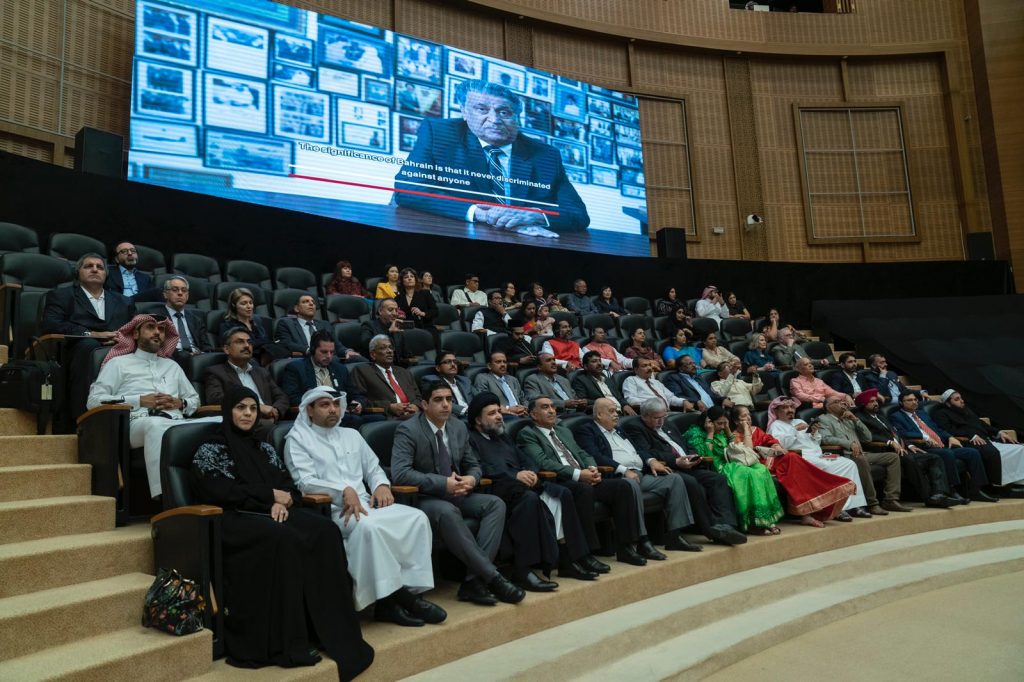 The executives addressed regional challenges and opportunities to advance respect for all faiths in the workplace to counter the rising tide of restrictions on freedom of religion and belief seen in many areas around the world. More than a dozen executives involved in the multi-day summit pledged their commitment to promoting faith-inclusive environments for their workers, through the Religious Freedom & Business Foundation’s Corporate Pledge. They also committed to leveraging their broader influence to advance interfaith religious understanding across the region.
The executives addressed regional challenges and opportunities to advance respect for all faiths in the workplace to counter the rising tide of restrictions on freedom of religion and belief seen in many areas around the world. More than a dozen executives involved in the multi-day summit pledged their commitment to promoting faith-inclusive environments for their workers, through the Religious Freedom & Business Foundation’s Corporate Pledge. They also committed to leveraging their broader influence to advance interfaith religious understanding across the region.
In taking the Corporate Pledge, CEOs affirmed that freedom of religion or belief (“FoRB”) is a fundamental right. They also recognize that religious freedom promotes sustainable and innovative businesses, contributes to human advancement, and results in more peaceful and stable societies.
“The link between respect for religious expression and the growth and prosperity of business is often ignored. This is particularly true in regions where there is religious tension,” said Religious Freedom & Business Foundation President Dr. Brian Grim, who kicked off the discussion. “Businesses that foster a workplace environment where religious identity and expression is respected are happier and more productive. Faith acceptance, regardless of religious identification, can lead to more successful businesses and a unifying force for people, especially in religiously diverse areas like the Middle East and North Africa.”
The roundtable was held at the King Hamad Global Centre for Peaceful Coexistence. “The modern Kingdom of Bahrain is also known as the world’s leading center for peaceful coexistence and interfaith dialogue, and we are pleased to provide a safe and peaceful platform for all voices to be heard in the spirit of mutual respect and love,” said H.E. Dr. Shaikh Khalid bin Khalifa Al Khalifa, Chairman of the King Hamad Global Centre for Peaceful Coexistence, which also hosted an interfaith leadership conference as part of a two-day discussion about addressing the challenges of religious freedom in the greater Middle East.
Coming out of this inaugural event, the Chairman of This Is Bahrain, Betsy Mathieson, who moderated the discussion, announced that two more International Religious Freedom Business Roundtables will be held in Bahrain in the coming year. Religious Freedom & Business Foundation Vice President Greg Clark, who was invited today to meet with Bahrain Crown Prince Salman bin Hamad bin Isa Al Khalifa, also announced that additional roundtables to engage CEOs on religious inclusion in the workplace will be held in other countries in the region in 2020.
Numerous speakers referenced The Kingdom of Bahrain Declaration, which is highlights that different religious groups have lived harmoniously, side by side, in the Kingdom for hundreds of years.
ABOUT THE RELIGIOUS FREEDOM & BUSINESS FOUNDATION
The Religious Freedom & Business Foundation is the preeminent organization dedicated to educating the global business community, policymakers, non-government organizations and consumers about the positive power faith has on business and the economy. RFBF believes that business and religious freedom combine to form a powerful force for a better world. Through groundbreaking expert research, training programs, practical business tools and convening interfaith dialogue, RFBF helps demonstrate the critical link between respect for faith, successful enterprise and dynamic national economies. RFBF’s pioneering work serves as a catalyst for executives to promote Freedom of Religion or Belief for all people through employee programing, customer-facing policies, and leveraging their broader societal influence. RFBF is a non-partisan, non-political registered 501(c)3 non-profit organization in the United States. For more information or to get involved visit www.ReligiousFreedomandBusiness.org.
Dr. Judith Richter, CEO Medinol, brings people together focusing on the heart (cardiovascular & spiritual)!
7 Dec, 2019
On Sunday, Dec 8 2020, Middle East CEOs are gathering for the first-ever International Religious Freedom BUSINESS Roundtable. See the amazing way Dr. Judith Richter, CEO Medinol, brings together young people of different faiths focusing on the heart (cardiovascular & spiritual)!
The NIR School of the Heart is a comprehensive experiential program aimed at enriching the academic, cultural, social and personal development of promising teenagers throughout the Middle East. Their select group of students is offered a top-quality interactive education in the medical sciences, with an emphasis on cardiology, provided by world-class experts and with access to first-rate facilities. By engaging curious young minds from several nationalities in a multi-cultural educational environment, the program aims to encourage the students to communicate and share their knowledge with one another, and to propagate that knowledge and spirit within their home communities.
The NIR School is an independent, non-profit, non-political organization sponsored in full by Dr. Judith Richter and Dr. Kobi Richter who founded the school.
The NIR School looks forward to seeing its graduates become positive contributors to society, and hopes to play a constructive role in deepening cross-border social and professional relationships both today and in the future.
NOMINATIONS NOW OPEN FOR 2020 GLOBAL BUSINESS & INTERFAITH PEACE AWARDS
27 Nov, 2019
FOR IMMEDIATE RELEASE: December 2, 2019
Contact: nominations@religiousfreedomandbusiness.org
Awards to be Presented at the 3rd Biannual Dare to Overcome Business Festival in Tokyo
(GENEVA, CH) – In an effort to recognize and support global leaders in business and industry who are taking concrete action to advance interfaith understanding, religious freedom and peace in the workplace and marketplace, the UN Global Compact and the Religious Freedom & Business Foundation announced today the opening of nominations for the 2020 Global Business & Interfaith Peace Awards.
Held in conjunction with Tokyo 2020 Paralympic Games, the Awards highlight current or former CEOs who have demonstrated leadership in championing respect for faith in one of the following four categories: Core Business; Social Investment and Philanthropy; Advocacy and Public Policy Engagement; and Partnerships and Collective Action.
“The Global Business & Interfaith Peace Awards demonstrate the important role business leaders play in fostering interfaith understanding, religious freedom and peace. These leaders are making a difference toward a more tolerant, respectful and peaceful world. Their efforts are an inspiration for other business leaders,” said Religious Freedom & Business Foundation President Dr. Brian Grim.
“Religion and business are not contradictory forces. They are an alliance for understanding. Employees who feel their faith is respected in the workplace are more likely to be healthy, productive members of the workforce and society. We look forward to recognizing this year’s honorees in Tokyo,” Grim stated.
Past award recipients include Ernst & Young UK Chairman Steve Varley (UK), Former Dell Entrepreneur-in-Residence, Ingrid Vanderveldt (US), CEO of Future Pipe Industries H.E. Fouad Makhzoumi (Lebanon), CEO Shinework Media Jonathan Shen Jian (China), Founder and Chairman Iraq Britain Business Council Emma Nicholson, Baroness of Winterbourne (UK and Iraq) and former CEO of Tejari H.E. Sheikha Lubna Al Qasimi, (UAE), among others.
The 2020 Awards will be held at the Shinjuku Park Tower Hall, Tokyo, on August 25, 2020, coinciding with the opening of the 2020 Summer Paralympic Games. The awards presentations will be part of Dare to Overcome, a global business, arts, and peace festival in support of the Paralympic Movement and people with disabilities.
Deadline for nominations is February 29, 2020.
Video from past award ceremonies and additional information regarding the nominating process can be found at https://religiousfreedomandbusiness.org/awards-2020.
###
Religion hits the Inc. 5000: RFBF President Brian Grim quoted by Inc.
24 Nov, 2019
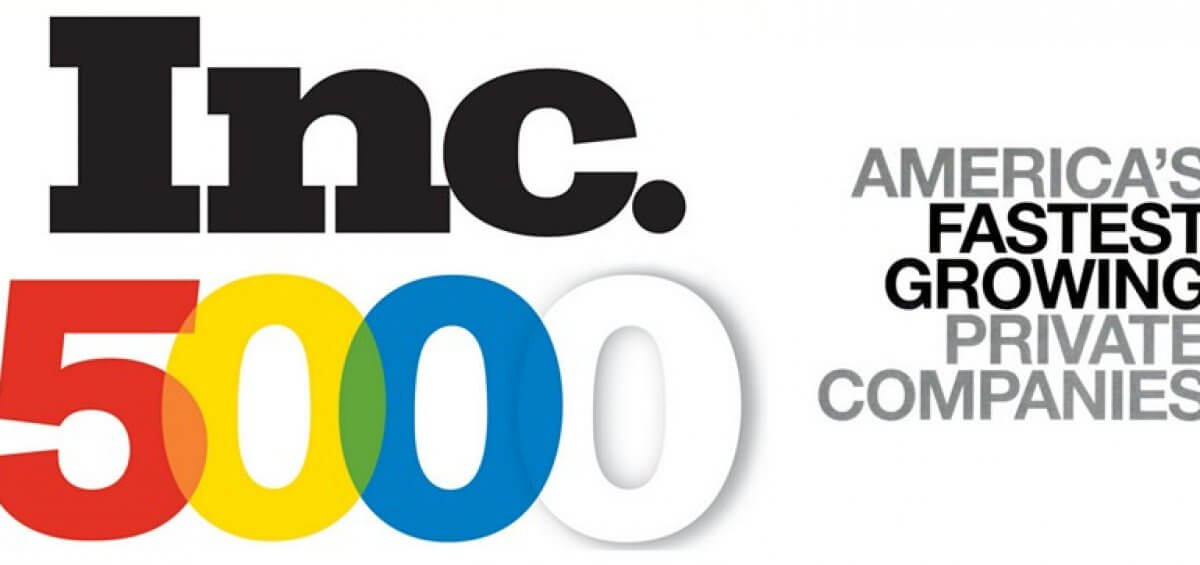 Check out how an entrepreneurial company focused on software for churches made the Inc. 5000 list of the fasting growing companies in the US (RFBF President Brian Grim provided background for the Inc. story).
Check out how an entrepreneurial company focused on software for churches made the Inc. 5000 list of the fasting growing companies in the US (RFBF President Brian Grim provided background for the Inc. story).
The Inc. 5000 is a guide to the 5,000 fastest-growing privately held companies in the U.S.
One of those companies is Flocknote, a popular text- and email-messaging service that’s exclusively focused on religious institutions. The Dallas-based company — profiled this month by Dan Whateley at Inc.com — was started by Matthew Warner 10 years ago had $2 million in revenue last year and registered at No. 1,520 on the Inc. 5000, an annual list of the fastest-growing private companies in the U.S.
Quoted in Inc., Matthew Warner notes that 10 years ago churches didn’t have a software budget, but now many of the larger ones spend thousands.
Indeed, the the worldwide market for church management software is expected to grow by hundreds of millions of dollars, according to the London-based research firm TechNavio.
TechNavio notes that “Numerous churches are increasingly adopting church management software to efficiently and smoothly manage daily operations such as managing membership emails and databases. The use of software leads to a higher accountability and saves time by organizing the information in a more accessible, user-friendly, and comprehensive manner. Additionally, it also enhances communication and improves management of financials. The adoption of church management software also regulates the room and facility schedules and records the deployment of volunteers. Such benefits of church management software will drive church management software market growth in the coming years.”
Like many traditional brick-and-mortar businesses, congregations are adapting their practices to keep people engaged and coming back. The need has become particularly urgent, as the Pew Research Center notes in its most recent Religious Landscape Study that an increasing number of Americans–Millennials in particular–say they do not subscribe to any organized religion.
“Millennials are so much less likely to go to church than their parents or grandparents,” says Brian Grim, a former senior researcher at the Pew Research Center who now serves as president of the Religious Freedom & Business Foundation. “One thing I’ve really been impressed with is that faith groups are not static,” he says, adding that religious communities need to respond to this reality.
Latest News
Donate
Thank you for your support!




